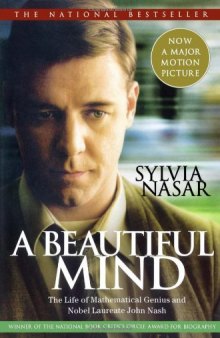 جزییات کتاب
جزییات کتاب
ذهن زیبا (به انگلیسی: A Beautiful Mind) نام کتابی است که دربارهٔ زندگی جان نَش ریاضیدان برندهٔ جایزهٔ نوبل و مسائلی که به دلیل بیماری اسکیزوفرنی با آنها مواجه میشود، نوشته شده است. این کتاب توسط سیلویا ناسار نوشته شده و در سال ۱۹۹۹ منتشر شده است.
بر اساس این کتاب، یک فیلم به همین نام در سال ۲۰۰۱ ساخته شد. صحنههایی از فیلم تفاوتهایی با زندگی واقعی جان نَش دارند. برای مثال صحنه مربوط به پیداکردن الگوهای مختلف در ستارگان، صحنهای که پسر جان نَش در حال غرق شدن در وان حمام است و موارد مربوط به ابزار تولید کننده رمز عبور که در دست جان نَش قرار گرفته است، کاملاً خیالی میباشند. فیلم بیانگر فداکاری بسیار آلیشیا، همسر جان نَش، در رابطه با وی است و این در حالی است که این زوج در سال ۱۹۶۳ از یکدیگر جدا شده و پس از هفت سال، مجدداً در سال ۱۹۷۰ آلیشیا به جان نَش اجازه داده است تا در خانه وی زندگی کند که این رابطه مطلقاً یک رابطه احساسی نبوده است.
In this biography, Sylvia Nasar recreates the life of a mathematical genius whose brilliant career was cut short by schizophrenia and who, after three decades of devastating mental illness, miraculously recovered and was honored with a Nobel Prize. A Beautiful Mind traces the meteoric rise of John Forbes Nash, Jr., from his lonely childhood in West Virginia to his student years at Princeton, where he encountered Albert Einstein, John von Neumann, and a host of other mathematical luminaries. At 21, the handsome, ambitious, eccentric graduate student invented what would become the most influential theory of rational human behavior in modern social science. Nash's contribution to game theory would ultimately revolutionize the field of economics. At 30, Nash was poised to take his dreamed-of place in the pantheon of history's greatest mathematicians. Then Nash suffered a catastrophic mental breakdown. Nasar details Nash's harrowing descent into insanity - his bizarre delusions that he was the Prince of Peace; his resignation from MIT, flight to Europe, and attempt to renounce his American citizenship; his repeated hospitalizations, from the storied McLean, where he came to know the poet Robert Lowell, to the crowded wards of a state hospital; his "enforced interludes of rationality" during which he was able to return briefly to mathematical research. At age 66, twin miracles - a spontaneous remission of his illness and the sudden decision of the Nobel Prize committee to honor his contributions to game theory - restored the world to him. Nasar recounts the bitter behind-the-scenes battle in Stockholm over whether to grant the ultimate honor in science to a man thought to be "mad. She describes Nash's current ambition to pursue new mathematical breakthroughs and his efforts to be a loving father to his adult son.
 دانلود کتاب
دانلود کتاب
 جزییات کتاب
جزییات کتاب








 این کتاب رو مطالعه کردید؟ نظر شما چیست؟
این کتاب رو مطالعه کردید؟ نظر شما چیست؟
